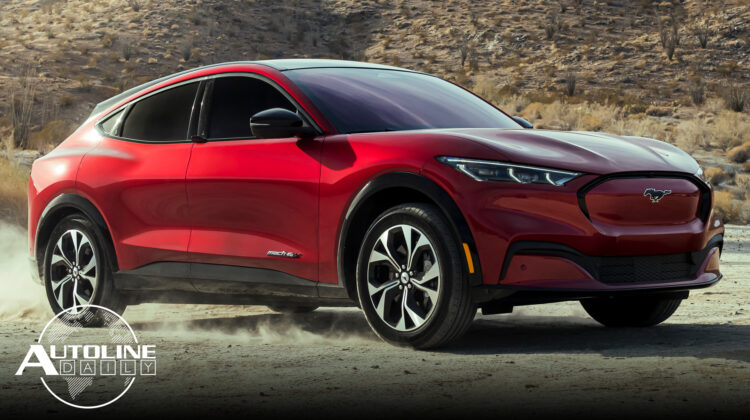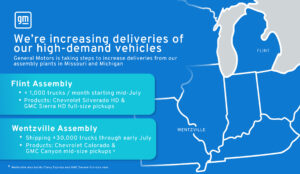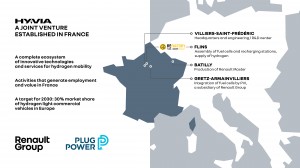
Listen to “AD #3094 – Electric Mustang Gets Priority; Ford Used "Cheap" Seat to Skirt Chicken Tax; U.S. Plans Battery Recycling Push” on Spreaker.
Follow us on social media:
Runtime: 8:11
0:07 GM Putting Chip Shortage In Its Rearview
1:05 Nissan’s All-New EV Delayed by Chip Shortage
1:30 Electric Mustang Gets Priority Over Gas Mustang
2:41 Renault Forms New Hydrogen JV
3:16 Ford Used “Cheap” Seat to Skirt Chicken Tax
4:16 Drivers More Reckless During Lockdowns
5:30 U.S. Plans Battery Recycling Push
6:12 U.S. EV Sales Down in May
6:44 Less Chinese Order Tesla’s in May
Visit our sponsors to thank them for their support of Autoline Daily: BorgWarner, Bridgestone, Intrepid Control Systems and Schaeffler.
This is Autoline Daily, the show dedicated to enthusiasts of the global automotive industry.
GM RUNNING OUT OF CHIP DIP
GM is starting to put the chip shortage in its rear-view mirror. It’s going to boost deliveries to customers in the U.S. and Canada over the next month. It will increase production of the Chevy Silverado HD and GMC Sierra HD trucks by 1,000 units per month in mid-July at its Flint assembly plant. Shipments of the Chevy Colorado and GMC Canyon will increase by 30,000 units from mid-May. And its U.S. plants that build its most capacity constrained products will not take a summer shutdown break. But GM is not completely out of the woods yet and says several global plants will remain capacity constrained through June and July. Even so, GM expects its first-half financial results to be significantly better than it previously forecast.
NISSAN’S ALL-NEW EV DELAYED A FEW MONTHS BY CHIP SHORTAGE
But not all automakers are handling the chip shortage as well as GM and now Nissan’s all-new electric crossover, the Ariya, is being delayed. It was supposed to launch in Japan in the middle of the year but Nissan now says it won’t be available until “this winter.” It will be introduced in the U.S. and Europe a few months after that.
ELECTRIC MUSTANG GETS PRIORITY OVER GAS MUSTANG
Maybe Nissan should have taken a page out of Ford’s book and prioritized chips for its electrics. So far this year, Ford has built 1,700 more Mustang Mach-Es than the regular gas-powered Mustang. That’s because its Flat Rock, Michigan plant that produces the Mustang is being impacted by the chip shortage and last month it didn’t build any Mustangs. The Mach-E is produced at a plant in Mexico. Ford is also prioritizing chips for its new launches including the Bronco, Bronco Sport and F-150.
RENAULT FORMS NEW HYDROGEN JV
More and more automakers are coming out with hydrogen fuel cells for commercial vehicles. Now Renault is getting involved. It’s forming a joint venture with a company called Plug Power to equip Renault’s Master vans with fuel cells. The joint venture is called HYVIA. They’ll use the same electric motors used in the battery versions of these vans. Renault says commercial owners will prefer fuel cells because heavy battery packs with BEVs reduce payload capacity and take much longer to refuel.
FORD USED “CHEAP” SEAT TO GET AROUND CHICKEN TAX
Ford is facing a big fine for trying to skirt the so-called “Chicken Tax,” a 25% import tariff placed on cargo vehicles and trucks. U.S Customs and Border Protection (CPB) ruled in 2013 that Ford imported Transit Connect vans from Turkey as passenger vehicles with a cheap rear seat that was designed to be immediately removed once it cleared customs. That allowed it qualify as a passenger vehicle, which meant it was hit with a 2.5% tax rather than the 25%. Ford argued the seat met safety standards and has fought the ruling, but now says it faces a fine between $652 million and $1.3 billion. The U.S. CBP is also seeking additional import duties of $181 million.
DRIVERS MUCH MORE RECKLESS DURING LOCKDOWNS
Even though fewer people were out driving last year because of pandemic lockdowns, and there were fewer accidents, traffic fatalities in the U.S. shot up to their highest levels in over a decade. 38,680 people were killed in motor vehicle accidents, the highest rate since 2006. Something about COVID caused people to drive much more recklessly. Data shows that amongst those killed, fewer wore seatbelts, more of them were speeding, and more of them were high or drunk.
U.S. PLANS BATTERY RECYCLING PUSH
The Biden Administration wants to increase spending on surface transportation by over half a trillion dollars, mostly for crumbling roads and bridges. But it also includes $4 billion for EV charging stations and another $4 billion for electric transit busses. Reuters reports the Administration is going to launch a big research effort aimed at recycling EV batteries. That could reduce the need for mining new copper by 55%, for lithium by 25%, and for cobalt and nickel by 35%. In other words, there’s a gold mine worth of materials in used EV batteries.
U.S. EV SALES HIT POTHOLE
Sales of electric cars hit a pothole in the U.S. market in May compared to April. Sales fell 9% and EV market share fell to 2.4%. Most of the drop came from the Tesla Model Y which was down 20% and the Porsche Taycan which was down 44%. Most EV sales were flat but some posted solid gains. The Audi e-Tron and e-Tron Sport shot up 62%. The Nissan Leaf was up 32%.
TESLA HOPES FOR JUNE FLOWERS IN CHINA AFTER MAY SHOWERS
Meanwhile in China, Reuters reports that Tesla’s sales fell 50% last month. It sold only 9,800 cars compared to more than 18,000 in April and over 35,000 in March. Tesla was criticized by various government entities over the last few months and has been banned from military and some government locations. We don’t know if that’s what’s causing the drop in sales, but some of Tesla’s direct competitors, like NIO and XPeng, reported big increases in sales.
And that wraps up this week’s worth of reports. Thanks for watching and we’ll see you on Monday.
Thanks to our partner for embedding Autoline Daily on its website: WardsAuto.com
Seamus and Sean McElroy cover the latest news in the automotive industry for Autoline Daily.








